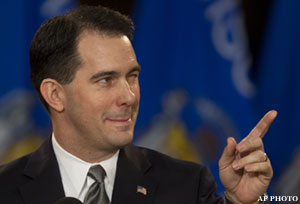March Madness is here. People around the country are scrambling to fill out their brackets. And like every other year, the one-and-done run for the NCAA title will bring out plenty of drama, intensity and especially pride.
But this isn’t just about pride in a team or in a school. March Madness can bring out pride in a city, state, or even in an entire way of life. And that’s why the performance of a certain Big Ten team may affect a real-life drama going on outside of the sports world.

Science is now confirming something successful politicians have seemed to know for a while: support your local sports teams. It has been found that when local teams are victorious, voters are more pleased with elected officials. The impact is even stronger for teams deemed as “powerhouses.” During the 2009 NCAA basketball tournament, researchers surveyed over 3,000 people who lived in areas with teams in the tournament, asking each to name their favorite team. Respondents were then asked to rate the performance of President Obama. On average, people whose favorite teams had just won a March Madness game rated the president higher than did those whose teams had recently lost. In other words, when the local team wins, the fans feel better about themselves, and therefore their representatives in office. Just ask former New York mayor Rudy Giuliani, who was wildly unpopular at the beginning of his first term in 1993, but rode a resurgence that perhaps not-so-coincidentally mirrored that of his beloved Yankees. Giuliani even scored political points by chastising would-be U.S. Senate race opponent Hillary Clinton for not being sufficiently pro-pinstripe.
This brings us to Wisconsin Gov. Scott Walker. He attended the Super Bowl in Dallas in February and returned to Packers-happy Madison with a new resolve to close the state’s budget deficit. That meant a brutal fight with labor unions that now rages hotter than ever. Protesters march in the streets and 14 state representatives have fled to Illinois in a battle over the right of state workers to collectively bargain. A lot will depend on how Wisconsin voters feel, and the outcome of this dispute may end up being a referendum on Walker himself.
It’s silly to say Badgers basketball will determine whether Walker emerges victorious, but science does show that the pride of a deep tournament run may soothe some angry feelings in the state and replace them with contentment.
“Sport victories can increase happiness and consequently make people more content with the status quo,” says Neil Malhotra, coauthor of the March Madness study and associate professor of political science and business at University of Pennsylvania. “It could improve people’s perception of [Governor] Walker.”
Of course it’s possible that a Badgers run through the tournament will convince voters that everything is going fine in the state, and Walker’s push for fiscal stringency is not warranted. “Much of Walker’s argument for stripping public sector unions of collective bargaining rights is that the status quo is bad and Wisconsin is in trouble,” says Malhotra. “So a Wisconsin run to a championship may make it harder to galvanize public opinion on his side.” In that case, each Badger win slightly hurts the governor.
Then there’s the case of Detroit mayor Kwame Kilpatrick, who presided over that city during a time when the Red Wings won a Stanley Cup, the Pistons dominated the NBA Eastern Conference, and the Tigers made an unlikely run to the World Series. But when the scandal-plagued Kilpatrick stood to address fans during the Wings’ post-title parade in 2008, he was booed mercilessly.
Gov. Walker doesn't have anywhere near the troubles Kilpatrick did. But no matter what the hometown teams do, some politicians just can’t win.
-- Erica Orange is a futurist for Weiner, Edrich and Brown in New York City.




